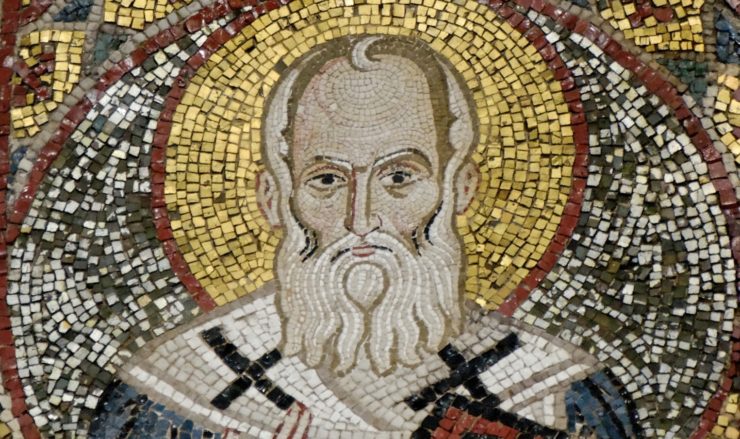
Today we continue our regular series called “Learning from the Saints.” Our guide is expert Bert Ghezzi, a dear friend of mine and the author of numerous books including Voices of the Saints, Saints at Heart, and Discover Christ: Developing a Personal Relationship with Jesus.
His more recent books are The Power of Daily Mass and The Heart of Catholicism. You can learn more about Bert and his work at BertGhezzi.com.
Today, Bert profiles St. Gregory Nazianzen, whose feast day is today. He was a fourth-century archbishop and theologian, and he is widely considered the most accomplished rhetorical stylist of the patristic age.

As a young man at school in Athens, St. Gregory Nazianzen became best friends with *St. Basil, his polar opposite. Basil was the practical activist and Gregory the intellectual mystic. They complemented each other, and together their works influenced the shape of Christian spirituality for many centuries.
Gregory’s life theme was the union with God that Christ had come to bestow on human beings. In the following sermon excerpt, he celebrates baptism, the sacrament through which Christ dispenses that incomparable gift of divine illumination.
“Illumination is the splendor of souls, the conversion of life, the aid to our weakness, the renunciation of the flesh, the following of the Spirit, the fellowship of the Word, the improvement of the creature, the overwhelming of sin, the participation of light, the dissolution of darkness. It is the carriage to God, the dying with Christ, the perfecting of the mind, the bulwark of faith, the key of the kingdom of heaven, the transformation of life, the removal of slavery, the loosing of chains, the remodeling of the whole person.
“Why should I go into further detail? Illumination is the greatest and most magnificent of the gifts of God.
“And as Christ the Giver is called by many various names, so too is this gift. We call it the gift, the grace, baptism, anointing, illumination, the clothing of immortality, the bath of regeneration, the seal and everything that is honorable.
“We call it the gift because it is given to us in return for nothing on our part. Grace because it is conferred even on debtors. Baptism because sin is buried with it in the water. Anointing as priests and kings for such were they who were signed with oil. Illumination because of its brilliance. Clothing because it hides our shame. The bath because it washes us. The seal because it preserves us and is moreover the indication of lordship. The heavens rejoice in the gift. The angels glorify it because of its kindred splendor. The gift is the image of the heavenly bliss. We long to sing out its praises, but we cannot worthily do so.”
Gregory Nazianzen should be named patron saint of all who want one thing and have to settle for another. All his life Gregory longed for the solitude where he could simply rest in God. Instead circumstances constantly dragged him into the public arena where he had to use his considerable gifts to serve God’s people. At 30 he wanted to retire as a monk with Basil at Pontus. But he was ordained over his protests and for fifteen years reluctantly served as coadjutor to his father, who was the bishop of Nazianzus.
In 380 several bishops persuaded Gregory to come to Constantinople to help turn the tide against Arianism. He turned his house into a church named Anastasis, denoting a place where the true faith would revive. There he preached his celebrated sermons in which he defined the characteristics of the Trinity. With his friend St. Gregory of Nyssa, in 381 he presided over the Council of Constantinople that put the nails in Arianism’s coffin.
Worn down by stress and controversy, in 384 Gregory retired to his estates at Nazianzus. He finally enjoyed a few years of solitude there before he died in 390.
“Be purified that you may be like lights in the world, a quickening force to all others. May you stand as perfect lights beside that great Light. And may you learn the mystery of the illumination of heaven, enlightened by the Trinity more purely and clearly.”
— St. Gregory Nazianzen
Read more from Bert at his website www.BertGhezzi.com, or check out his many books on Amazon.
